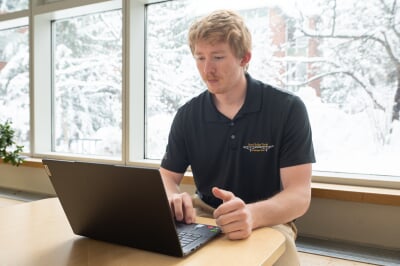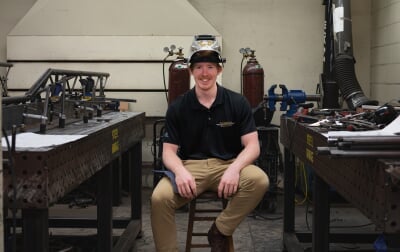As Michigan Tech senior Connor Tokie prepares for finals and graduation, he's also hosting and competing in the Eastern Great Lakes Regional Student Steel Bridge Competition.
April is a busy month for students at Michigan Technological University, who are known for their high levels of involvement in and out of the classroom. Graduating senior Connor Tokie is no exception. Together with his fellow members of Michigan Tech's chapter of the American Society of Civil Engineers (ASCE), Tokie will be hosting the Eastern Great Lakes ASCE Student Symposium at MTU on April 10-12. The symposium is the regional competition for ASCE teams including Steel Bridge, Concrete Canoe and Timber Strong. The event will bring more than 15 universities and 400 competitors from across Michigan and Ohio to Houghton.
Tokie will compete in the symposium as captain of Michigan Tech's Student Steel Bridge Competition team, a group he's been a part of for the last four years. And three days afterward, on April 15, Tokie will also present at Michigan Tech's 25th Design Expo student showcase as a member of the Built World Enterprise, an interdisciplinary team dedicated to advancing the built world that engineers design and construct.
All of this takes place just weeks before Tokie graduates with a double major in civil engineering and environmental engineering. As his time at the University comes to a close, he is looking back on his road to Tech and where his degree will take him in the future.
Becoming an Engineering Husky
Tokie, who hails from Forest Lake, Minnesota, originally wanted to be a veterinarian. But after touring a few universities while he was still in high school, he realized that engineering was his true calling. A five-and-a-half-hour drive from home, Michigan Tech seemed like a great fit. As happens with so many prospective Huskies, when Tokie visited campus, he knew Tech was the perfect choice.

"I just fell in love with Tech's campus and the atmosphere here," said Tokie. "I knew that it was one of the best engineering schools in the U.S. It was the easy choice to make."
Tokie started at Tech as a mechanical engineering major. His passion for nature and being outdoors convinced him to switch to environmental engineering, and then his love for structures and math pushed him to add civil engineering. For Tokie, double majoring was a no-brainer because he cared about both fields and the combination makes him more versatile in the job market.
"It's really unique to have both the environmental and the civil aspect," said Tokie. "Instead of having two different people for a task, you can have one person, which I think is really unique to who I am and why I have both majors."
After he graduates, Tokie heads to a position as a geotechnical engineer with Braun Intertec in Hibbing, Minnesota. "I'll be working with the mines up there, collecting well and groundwater data, tying both environmental and civil engineering aspects together," he said.
Finding Fun and Learning Outside the Classroom
In addition to his studies, Tokie made the most of his time at Tech through extracurriculars. Besides involvement in Steel Bridge and Enterprise, Tokie also joined the Men's Volleyball Club. Alongside witnessing MTU's hockey team win their first-ever Mason Cup in 2024, Tokie counts his participation on the volleyball travel team among his most memorable moments at Tech.
"Last year, the men's volleyball team traveled to nationals and tied for fifth overall, which is something that I don't think we've ever done before," said Tokie. "That was an experience I'll never forget."
Tokie's involvement on campus and dedication to his fellow Huskies does not go unnoticed. Audra Morse, professor and chair of the Department of Civil, Environmental, and Geospatial Engineering, said Tokie has participated in all the best Michigan Tech has to offer its students.
"It has been a pleasure to watch Connor's growth over the years and to witness his leadership among his peers. He took on the challenge of majoring in civil engineering and environmental engineering, while being involved with the Steel Bridge Team, the Built World Enterprise, and working part-time," said Morse. "As for his legacy, he is leaving the Steel Bridge Team on a good path and he has positively impacted all of those who have worked with him."
Building Bridges Big and Small
Although Tokie's time on Michigan Tech's Steel Bridge team has not quite come to a close, he considers participating to be his crowning achievement as a Husky.
As a part of ASCE's society-wide competitions, the Student Steel Bridge Competition challenges students to extend their classroom knowledge to a practical and hands-on steel design project. In partnership with the American Institute of Steel Construction (AISC), each Steel Bridge team designs, fabricates, and tests a scale-model steel bridge that spans approximately 20 feet and can carry 2,500 pounds. The specifications of the project, including a defined scenario, change annually and are governed by exacting rules. The team must determine how to fabricate their bridge and then plan for an efficient assembly under timed construction conditions at the competition. Bridges are also load-tested, weighed, and judged on aesthetics.
Michigan Tech has a long history of both competing and excelling in the Steel Bridge competition. MTU competed in the first-ever contest alongside Lawrence Technology and Wayne State universities in 1987. Tokie joined the team in spring 2022.
"I had a friend present at a Sustainability in Civil Engineering course and I thought it sounded interesting," recounted Tokie. "They were looking for new people to join their build team and I thought it sounded pretty cool, like something I thought I would really enjoy."

For Tokie, who started as a member of the build team and worked his way up to his current leadership roles, being on the Steel Bridge team is a fun and effective way to hone his engineering skills.
"We are a very hands-on organization, so what we do helps us understand what we will do in the field of our future careers," he said. "We don't take a lot of design classes as civil engineers, so using design software like RAM Elements and SolidWorks helps give our members a leg up in the future when they want to start designing different kinds of buildings and structures."
The Steel Bridge competition begins each fall semester when AISC releases the annual rules and specifications. That's when teams get the details pertaining to bridge length, weight, and environmental conditions.
"Once those rules come out, we start designing many different aspects of different kinds of bridges that we've used in the past and new designs we might want to try for this year that we saw last year," explained Tokie.
Fabrication begins once the designs have been finalized. Team members, who have training opportunities to learn how to weld and construct bridges piece by piece, adhere to both their design specifications and AISC rules. Once the bridge is built, the final steps involve Huskies on the build team, who practice regularly to cut the time it takes to rapidly assemble the bridge during competition.
Tokie said building the bridge is the part of the competition he enjoys most. "We change variables during build practice to determine what the best combination of build team and time comes out to be," he said.
In addition to the design specs and build time, the Steel Bridge team must also consider what's known as construction economy. AISC provides equations for calculating the cost of each team's bridge. While each team aims for the fastest build time, variables such as weight, deflection, and number of build team members also highly influences the final score. A slower initial build time with fewer builders may win against a team that builds faster with more builders. "We look to see the economic advantage of keeping the cost low," explained Tokie.
In 2024, Michigan Tech's Steel Bridge team won the Eastern Great Lakes regionals and finished ninth in the nation among 47 teams at nationals. This year, the team's goal is to perform well and carry on the MTU Steel Bridge tradition of excellence — and also to put on an excellent regional competition at Tech for their 400-plus guests.
Tokie serves on the committee of students responsible for the symposium. "It's an honor to be able to host the regional competition," he said. "It's a really big deal that we get to host this year. We take a lot of pride in that and we are excited to have other schools up here."
Regionals will include competitions for Concrete Canoe, Timber Strong, land surveying, and more. The public is welcome to attend events, the majority of which will be held at Michigan Tech's Gates Tennis Center — where the Steel Bridge competition will be held on Saturday, April 12, from 8 a.m. to 6 p.m. Concrete Canoe races are scheduled for Houghton City Beach, weather permitting. The winning Steel Bridge teams go on to compete at nationals, hosted by Iowa State University on May 30-31.
Tokie and his teammates are looking forward to this year's competition.
"We feel good. We are excited," he said. "As competitors, we are treating it like any other regionals and are looking forward to seeing what the other teams bring to the table. We are hoping for a repeat of last year, but we will see what happens."
Michigan Technological University is an R1 public research university founded in 1885 in Houghton, and is home to nearly 7,500 students from more than 60 countries around the world. Consistently ranked among the best universities in the country for return on investment, Michigan's flagship technological university offers more than 120 undergraduate and graduate degree programs in science and technology, engineering, computing, forestry, business, health professions, humanities, mathematics, social sciences, and the arts. The rural campus is situated just miles from Lake Superior in Michigan's Upper Peninsula, offering year-round opportunities for outdoor adventure.






Comments